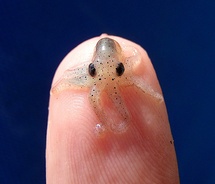The Secret Life of An Octopus: Cognitive Capabilities
Biology 342 Fall : Katrina Gertz & Maria Zapetis
Ontogeny: secrets in individual development
Ontogeny is the developmental explanation for sequential changes across the lifespan of an individual. In other words, how did this cognitive ability grow and change over one octopus’s lifetime? How is this individual octopus's cognitive abilities different from another octopus?
Personality
Personality is determined by "consistent behavioral differences amoung indivisuals" (Dugatkin, 2004). Hence, personality differences are defined as "consistent long-term phenotypic behavioral differences amoung individuals" or behavioral "variation among individuals" of the same species (Mather, 2008). Mather argues that "learning plays a fundamental role in [octopi] development," and has shown that octopi "personality traits were long-lasting" in one of her many studies. According to Dugatkin, octopi personality is quite similar to the characterization of documented human infant personality, giving support to cross-species personality similarity.
Complex personalities develop from temperaments - the basic patterns of individuality expressed in juveniles (Goldsmith et al, 1987). From the outset of an octopus's life, specific temperaments develop, influenced by both endogenous and exogenous factors. As a juvenile octopus encounters more and more diverse situations, its individual characteristics develop in response, becoming more complex so that, upon reaching adulthood, individuals can be said to have distinct personalities (Sinn et al, 2001).
Specifically, variables in the environment affect the post embryonic development of the octopus brain, resulting in individual variation. Yamazaki et al (2001) reported that differential development of brain lobe volume in 2 species of octopus (O. ocellatus and O. vulgaris) was based on their different post-hatching environments. Thus, the octopus's basic temperament acts as a precursor to personality.
Temperament is defined as individual differences in the behavioral tendencies of young organisms, and the development of temperamental traits have been shown in O. bimaculoides. Examples of octopus temperaments include active engagement, arousal, aggression, and avoidance (Sinn et al, 2001). Patterns of individual variation develop throughout octopus life: hormonal changes prepare the octopus for the shifts in environment that it will encounter as it reaches adulthood.


